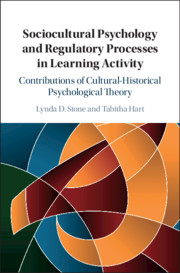 Sociocultural Psychology and Regulatory Processes in Learning Activity
Sociocultural Psychology and Regulatory Processes in Learning Activity Published online by Cambridge University Press: 30 September 2019
In Chapter 4, we suggest that competency be reimagined as a social identity. Social identities are inhabited or embodied representations (signs) of the values and statuses (possible roles) of a community. Social identities can be explicit or implicit. An identity of competency is an example of an implicit form of social identity that is linked to a local community’s socially shared but tacit category for competency. This category represents the values and expectations for how to be, act, or feel like a competent member of a community. In learning settings, an identity of competency is implicitly valued and highly desired because it brings recognition and status (rights/power) for regulating the behaviors of self and others as well as indicates a willingness to persist in complex learning. Understanding how this form of identity is enacted can reveal what forms of behavior regulation indicate competency in learning communities.
To save this book to your Kindle, first ensure no-reply@cambridge.org is added to your Approved Personal Document E-mail List under your Personal Document Settings on the Manage Your Content and Devices page of your Amazon account. Then enter the ‘name’ part of your Kindle email address below. Find out more about saving to your Kindle.
Note you can select to save to either the @free.kindle.com or @kindle.com variations. ‘@free.kindle.com’ emails are free but can only be saved to your device when it is connected to wi-fi. ‘@kindle.com’ emails can be delivered even when you are not connected to wi-fi, but note that service fees apply.
Find out more about the Kindle Personal Document Service.
To save content items to your account, please confirm that you agree to abide by our usage policies. If this is the first time you use this feature, you will be asked to authorise Cambridge Core to connect with your account. Find out more about saving content to Dropbox.
To save content items to your account, please confirm that you agree to abide by our usage policies. If this is the first time you use this feature, you will be asked to authorise Cambridge Core to connect with your account. Find out more about saving content to Google Drive.